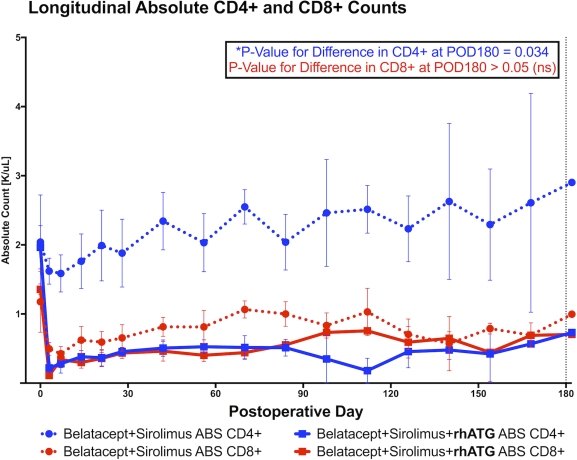Rhesus-Specific Anti-Thymocyte Globulin as an Adjuvant to Costimulatory-Blockade-Based Immunotherapy
1Department of Surgery, Duke University, Durham, NC
2MassBiologics, University of Massachusetts Medical School, Boston, MA.
Meeting: 2018 American Transplant Congress
Abstract number: D30
Keywords: Co-stimulation, Induction therapy, Kidney transplantation
Session Information
Session Name: Poster Session D: Immunosuppression Preclinical Studies
Session Type: Poster Session
Date: Tuesday, June 5, 2018
Session Time: 6:00pm-7:00pm
 Presentation Time: 6:00pm-7:00pm
Presentation Time: 6:00pm-7:00pm
Location: Hall 4EF
Background Belatacept targets de novo alloimmune responses with minimal off target effects in renal transplantation, though adjuvant therapy is required to control costimulation-blockade resistant rejection (CoBRR). Therapeutic lymphocyte depletion is employed as induction therapy, though the optimal regimen is unknown. To recapitulate effects of Anti-thymocyte Globulin in a preclinical model of costimulation-blockade based immunotherapy, Rhesus-specific anti-thymocyte globulin (rhATG) was developed by purifying IgG from rabbits immunized with rhesus thymocytes. We tested the hypothesis that addition of rhATG would synergize with costimulation-blockade-based immunotherapy to prevent CoBRR.
Methods Rhesus macaques (n=11) underwent bilateral nephrectomy and MHC mismatched renal transplant. Controls (n=5) received a single dose of steroid and belatacept+sirolimus maintenance. Experimental animals (N=6) received base regimen with 5 doses rhATG (4mg/kg) daily beginning POD0. Serial creatinine was used to monitor renal function.
Results At 6 months, no animals receiving rhATG experienced acute rejection (0% v 20% in control, P=0.29). Analysis of longitudinal phenotyping demonstrated that addition of rhATG resulted in significant and durable lymphocyte depletion. Depletion was more profound in CD4+ than CD8+ cells. Mean CD4+ count remained lower in rhATG-treated animals through POD180 (P = 0.034).
Conclusions Addition of rhATG to costimulation-blockade based immunotherapy results in reliable T-lymphocyte depletion, an effect that persists through the first 180 postoperative days. Longitudinal phenotypic analysis is ongoing to further characterize the nature of homeostatic repopulation following induction with rhATG, and to assess impact on long-term graft survival. These data suggest that rhATG may be an optimal agent for the study of effects of depletional induction in rhesus renal allotransplantation that more closely recapitulates Thymoglobulin in human studies. 
CITATION INFORMATION: Mulvihill M., Ezekian B., Gao Q., Samy K., Davis R., Leopardi F., Belli A., Flores W., Buzby A., Reimann K., Collins B., Kirk A. Rhesus-Specific Anti-Thymocyte Globulin as an Adjuvant to Costimulatory-Blockade-Based Immunotherapy Am J Transplant. 2017;17 (suppl 3).
To cite this abstract in AMA style:
Mulvihill M, Ezekian B, Gao Q, Samy K, Davis R, Leopardi F, Belli A, Flores W, Buzby A, Reimann K, Collins B, Kirk A. Rhesus-Specific Anti-Thymocyte Globulin as an Adjuvant to Costimulatory-Blockade-Based Immunotherapy [abstract]. https://atcmeetingabstracts.com/abstract/rhesus-specific-anti-thymocyte-globulin-as-an-adjuvant-to-costimulatory-blockade-based-immunotherapy/. Accessed February 21, 2026.« Back to 2018 American Transplant Congress
